Throughout the 1997-98 season members of the Washington Capitals reached milestones, accolades, and the ability to represent their country at the Olympics.
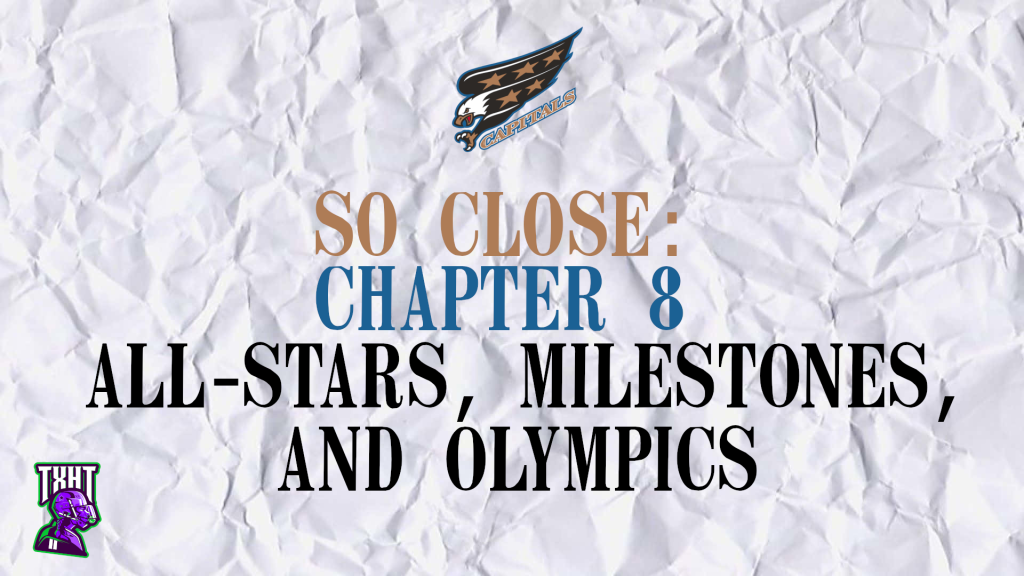
All-Stars
On January 5th, 1998, forward Peter Bondra and goaltender Olaf Kolzig were named as reserves for the World All-Star team for the 1998 NHL All-Star Game on January 18th in Vancouver, Canada.
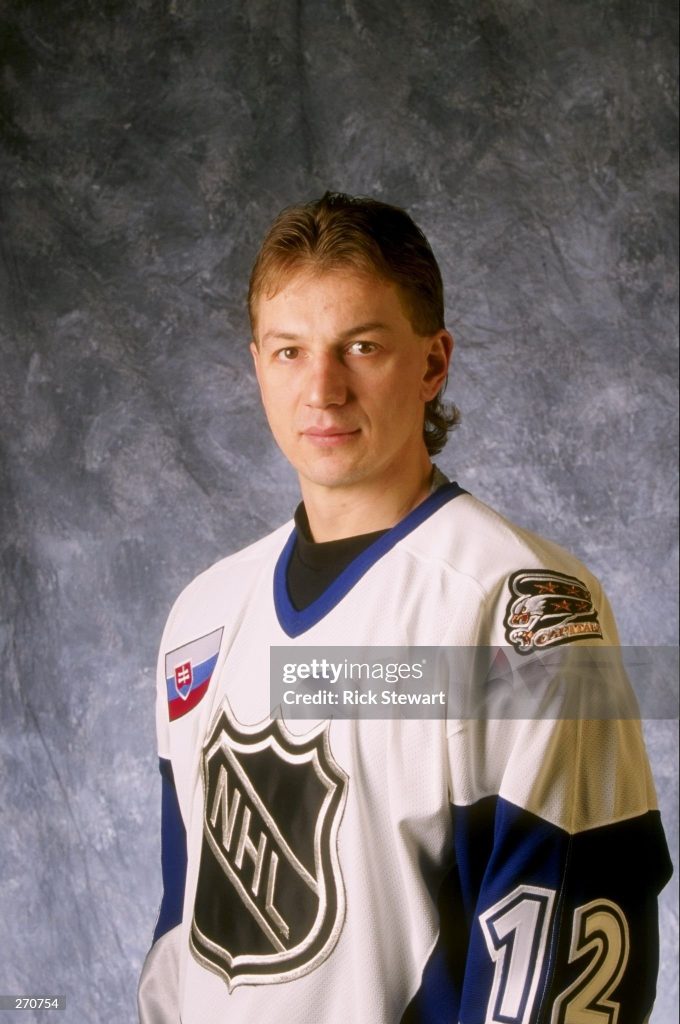
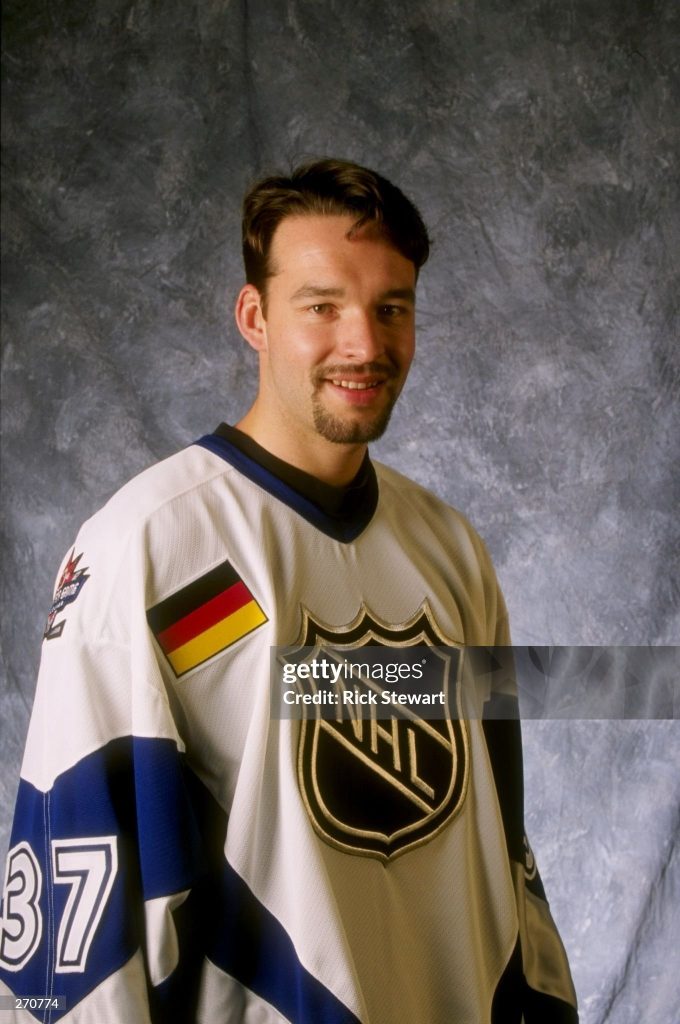
Heading into All-Star weekend, Bondra, going to his fourth All-Star Game, looked to defend his title as the league’s fastest skater. At the 1997 All-Star weekend in San Jose, CA, Bondra won the event by skating through the pre-set oval track in 13.611 seconds. “It’s something special and it feels good when you win it, so for sure I will try to do it again this year,” Bondra said. “But who knows? A little mistake can make the difference in your race, so I don’t want to be excited too much and think about it too much. I want to have fun; that’s what it’s all about.”
For Kolzig, this was his first All-Star Game. “Having this year work out the way it has is really amazing,” Kolzig said. “Getting invited to the All-Star Game at all is a huge thrill, and to have it happen where your family is, is even better.”
Skills Competition
Like many of the players participating at the weekend’s festivities, both Kolzig (Germany) and Bondra (Slovakia) were going to represent their countries at the Nagano Olympics in February. To promote the Winter Games, the NHL changed the All-Star Game’s format from East versus West to North America All-Stars against World All-Stars. “I’m excited for [the format] because I think there will be more competition and I think it will be better for the fans,” Bondra said. “This is a special hockey holiday for us. It’s a chance to be with all those good hockey players and meet the guys who played the game before you.”
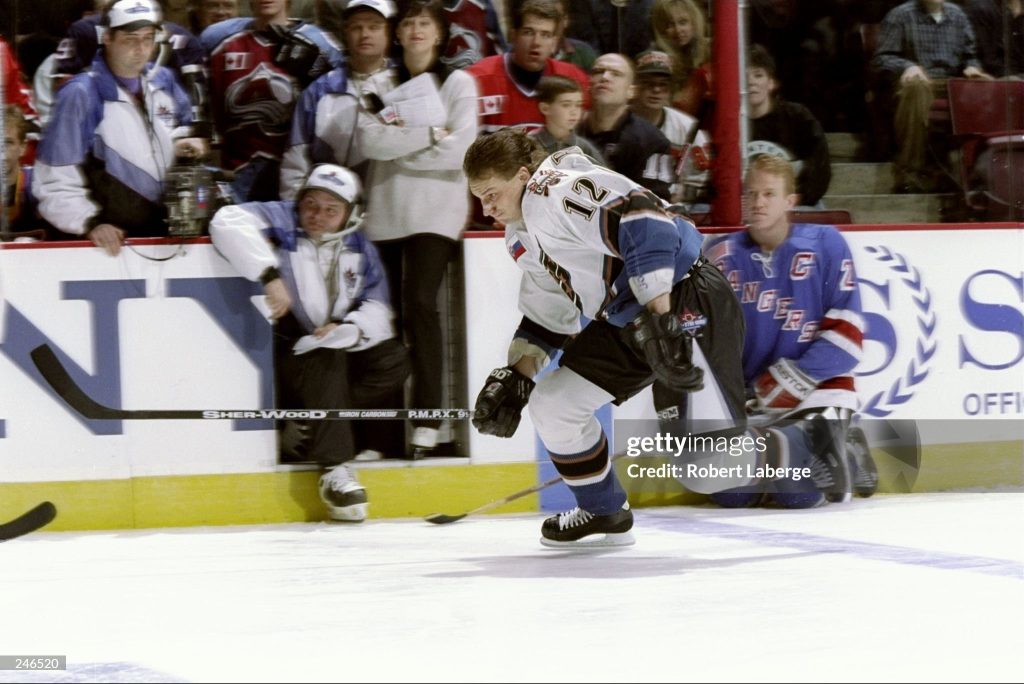
On January 17th at the NHL All-Star skills competition, Peter Bondra lost his title as the NHL’s fastest skater. Bondra clocked in at 13.63 seconds to complete the lap around the rink at GM Place, but New Jersey Devils defenseman Scott Niedermayer bested Bondra with a time of 13.56 seconds to take the crown. “It was close. It came down to inches,” Bondra said. “I thought it was a good race. Hopefully we’ll have a rematch next year.”
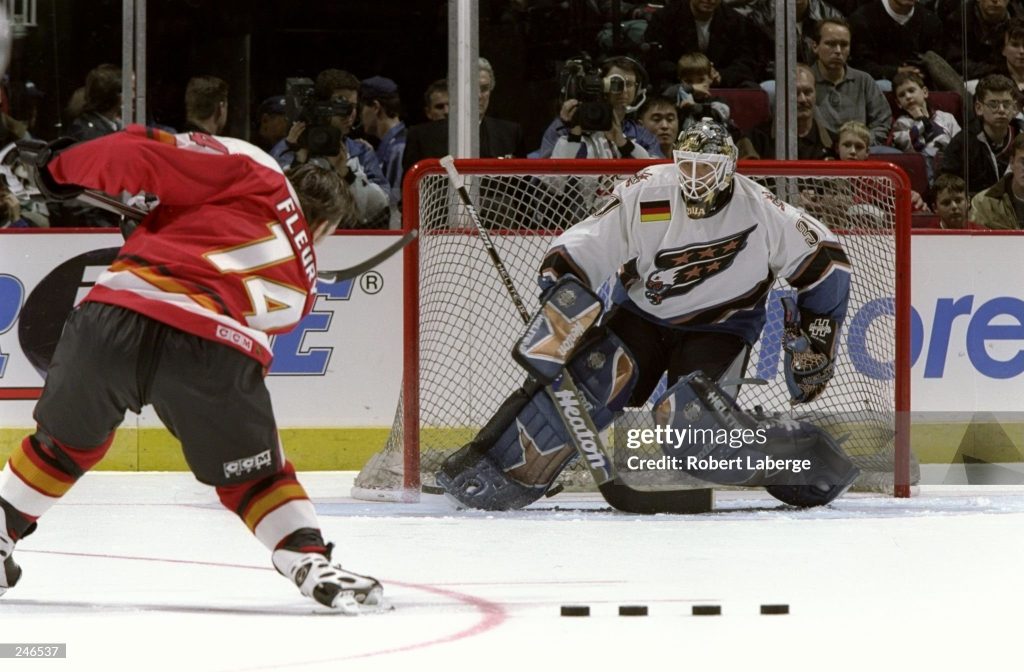
Olaf Kolzig also participated in the competitions, and he tied for second place with Dallas’s Eddie Belfour and Colorado’s Patrick Roy with 11 saves each. Buffalo Sabres goaltender Dominik Hasek won the goaltending competition with 13 saves. “I saved face, that’s all I wanted to do,” Kolzig said. “I’ll admit it, I was nervous as hell. It was really fun, though.”
All-Star Game
On January 18th, the NHL All-Star Game took place at GM Place in Vancouver as the North American All-Stars took on the World All-Stars. North America topped the World 8-7 in a fun game. However, in the final minutes, forward Peter Bondra almost tied the game for the World All-Stars when he took a shot from the right point, which got lost in New Jersey Devils’ goaltender Martin Brodeur’s pads. Brodeur thought it was a goal, but the audience’s applause told him he made the save. Bondra’s teammates couldn’t score on the rebound either. “It was pretty close and still we had a rebound, but we couldn’t get it in,” Bondra said. “Tough luck, but it was a lot of fun, too. It was a little more challenging, and I thought it was a really good game, a lot of intensity, a lot of skating, a lot of stickwork.”
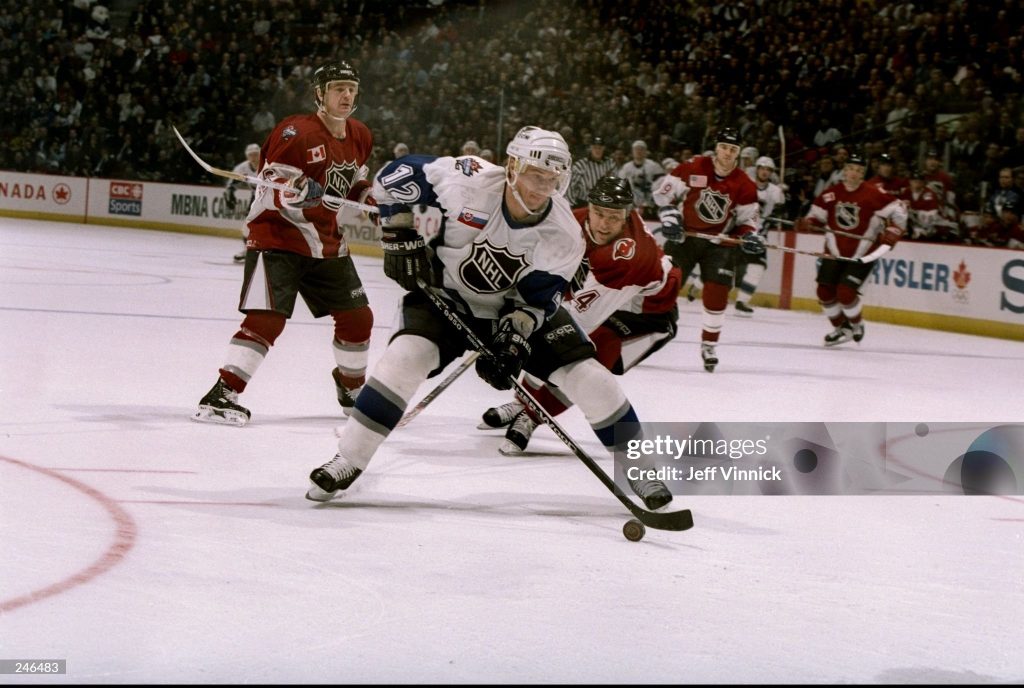
Bondra did assist Pittsburgh Penguins’ forward Jaromir Jagr’s goal in the first period to give the World All-Stars the 2-0 lead.
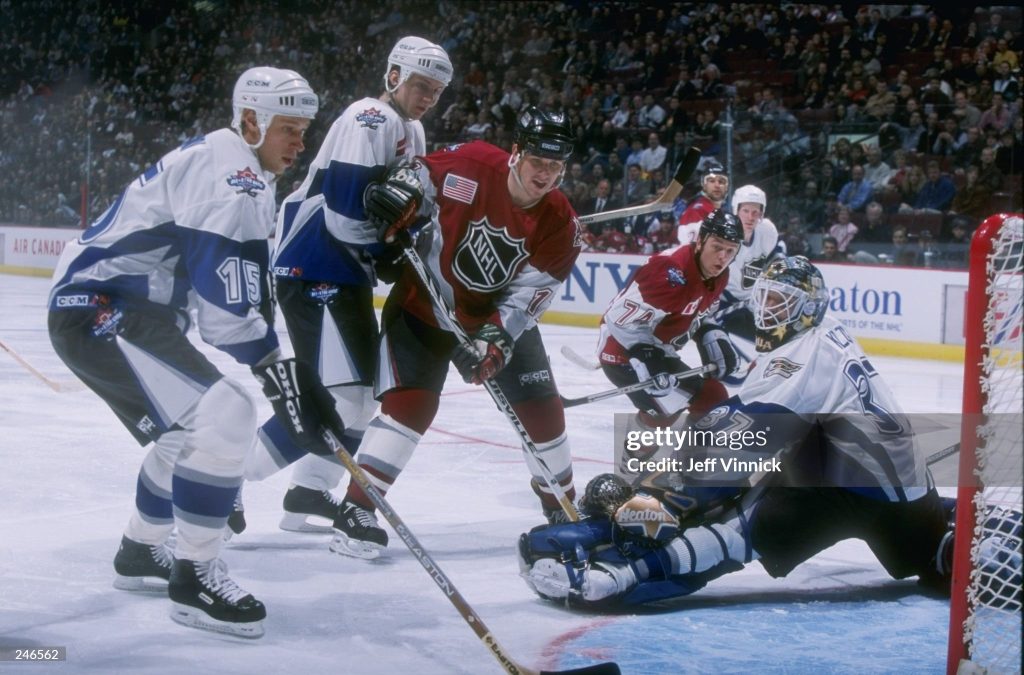
Goaltender Olaf Kolzig entered the game in the second period and gave up three goals on 17 shots faced. “[The coaches] were telling me right before the game to say goodbye to a couple of your defensemen because you’re not going to see them for the rest of the game, but it was more defensive than I thought,” Kolzig said. “I’d like the first goal back and the third one took a lucky bounce off my head, but I thought I played pretty solid. You know, I read the local paper here this morning, and they said that after Dominik Hasek comes out, that’s when the World team is questionable, that we [Kolzig and Phoenix goaltender Nikolai Khabibulin] were a couple of pretenders that were only here because of the new format. I’d like to see those guys, because I thought we held our own out there. I actually thought we maybe outplayed the other goaltenders.”
Milestones
1,000 Points Plateau – Adam Oates
On October 8th, 1997, forward Adam Oates recorded a five point game, with three goals and two assists, in a 6-3 victory over the New York Islanders. The five point night brought Oates’ career points total to 1,004.
“He’s been around the net the last few games; he’s been robbed a few times,” Dale Hunter said. “But he made sure he got it tonight.”
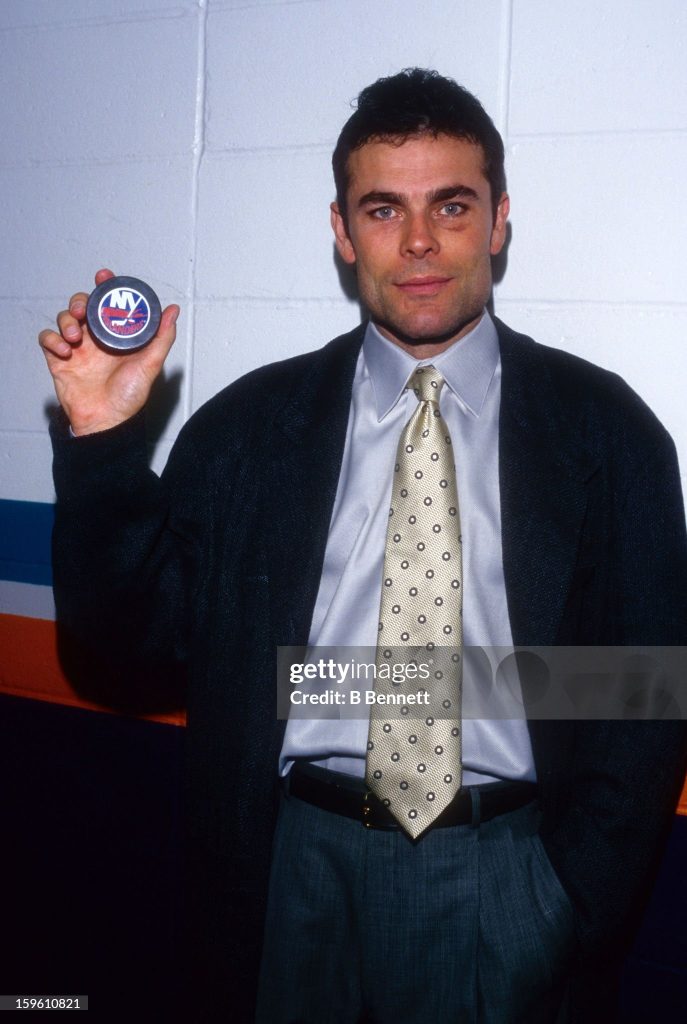
“It was a roller-coaster ride of a game–a little firewagon hockey,” coach Ron Wilson said. “But in the end we have the skill to get away with some things. Oates was tremendous. I could sense he was having one of those nights, and you have to ride great players when they get hot like that.”
Oates gave the puck from his 1,000th point to his mother, who was at US Airways Arena on October 4th with the hope he would record it then. Oates was disappointed he could not come through, and he readied his sticks before the game against the Islanders with extra care. Oates was determined to get him his 1,000th career point. “It feels good to get it over with,” Oates said. “Every milestone is a team thing.
Oates recorded his 1,000th point when he tipped in a Mark Tinordi slap shot from the blueline while shorthanded. After he scored, all of the Capitals left the bench to celebrate with Oates on the ice.
Oates became the 47th player in NHL history to record 1,000 points, and he was honored on October 11th before the Capitals hosted the Islanders. Oates was presented with a solid silver hockey stick during a pre-game ceremony.
1,000 Points Plateau – Phil Housley
On November 8th, 1997, defenseman Phil Housley became the second Capitals player to reach the 1,000 point plateau in the past month. Housley recorded an assist on the Capitals first goal of a 2-1 victory over the Edmonton Oilers when fellow defenseman Calle Johansson scored on the powerplay. “It’s great that [Housley got his 1,000th point], and early in the game too, so it wouldn’t weigh on him as the game wore on,” coach Ron Wilson said.
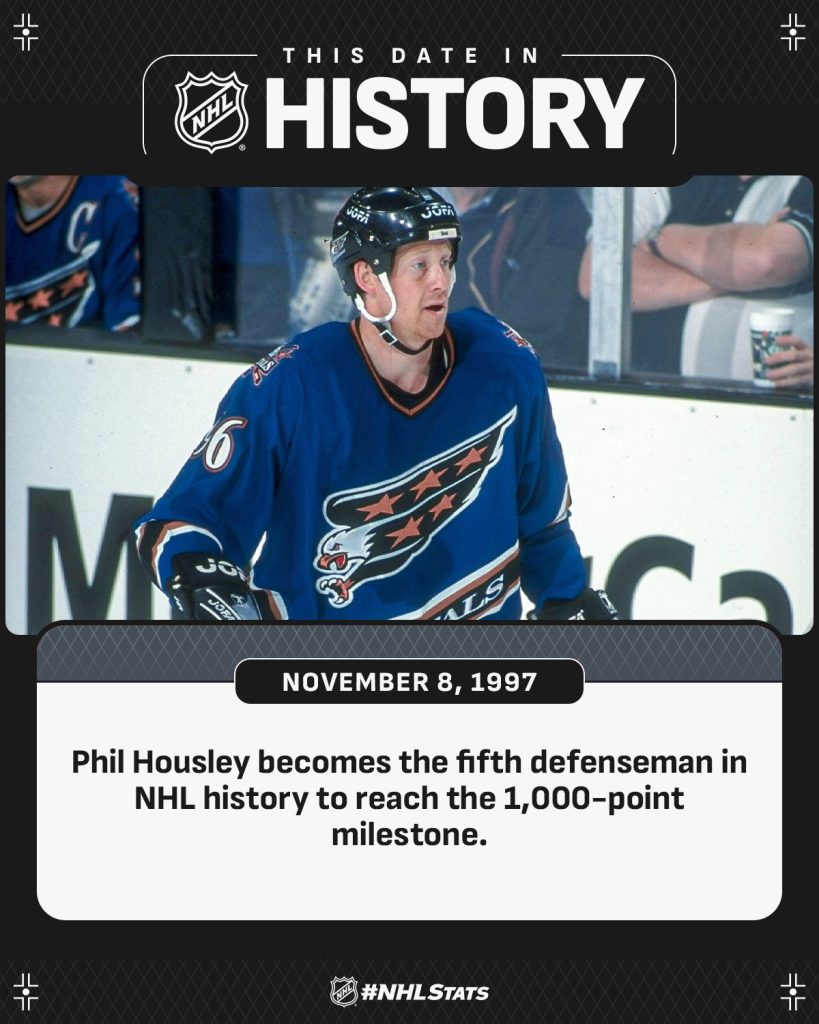
“It’s a real accomplishment, especially for a defenseman,” Oates said.
Housley became the 48th player in NHL history to reach the 1,000 point plateau. He also became the 6th defenseman and only the 2nd American to reach the milestone.
Housley was honored before the Capitals hosted the Colorado Avalanche on November 18th, 1997. NHL senior vice president Brian Burke honored Housley during the pre-game ceremony and the Capitals presented Housley with a solid silver hockey stick.
1,000 Points Plateau – Dale Hunter
On January 9th, 1998, forward Dale Hunter became the third and final Capitals player to reach the 1,000 point mark in a 4-1 victory over the Philadelphia Flyers. Hunter had three assists in the second period, and his assist on Craig Berube’s goal, the fourth and final goal of the game, gave Hunter his 1,000th career NHL point.
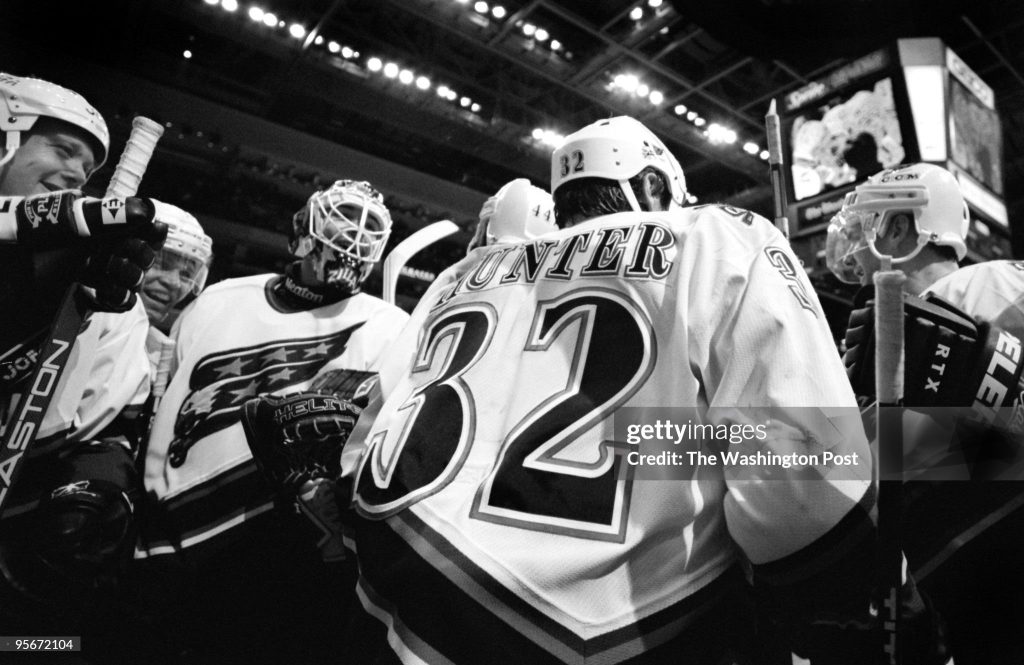
“It wasn’t like a meaningless 1,000th point,” coach Ron Wilson said. “We got on a roll in the [second] period against one of our biggest rivals and basically that goal put them away. We were able to ride that to the win.”
“It’s been great playing with Huntsy all this year and being a part of his 1,000th point is a big thrill for me, one that I’ll remember for a long time,” Berube said.
Hunter received three standing ovations from the sellout MCI Center crowd, and Hunter’s teammates came off the bench to smother him with congratulatory hugs.
“It’s a goal that was achievable, even though I’m not a 1,000-point man who takes 10 years — it took me 18, that’s all,” said Hunter, 37. “It’s one of those things where you work hard and get rewarded for it. But to do it with three points in one night, it’s something I’ve never even dreamt about. I didn’t even think it was feasible.” He also earned a nasty cut over his left eye to go along with his three assists.
At the time, Hunter was the only NHL player to have more than 300 career goals without ever having a 30-goal season. He is also the only NHL player to have more than 300 goals, 1,000 points, and more than 3,000 penalty minutes. Hunter became the 49th player in NHL history to record 1,000 points.
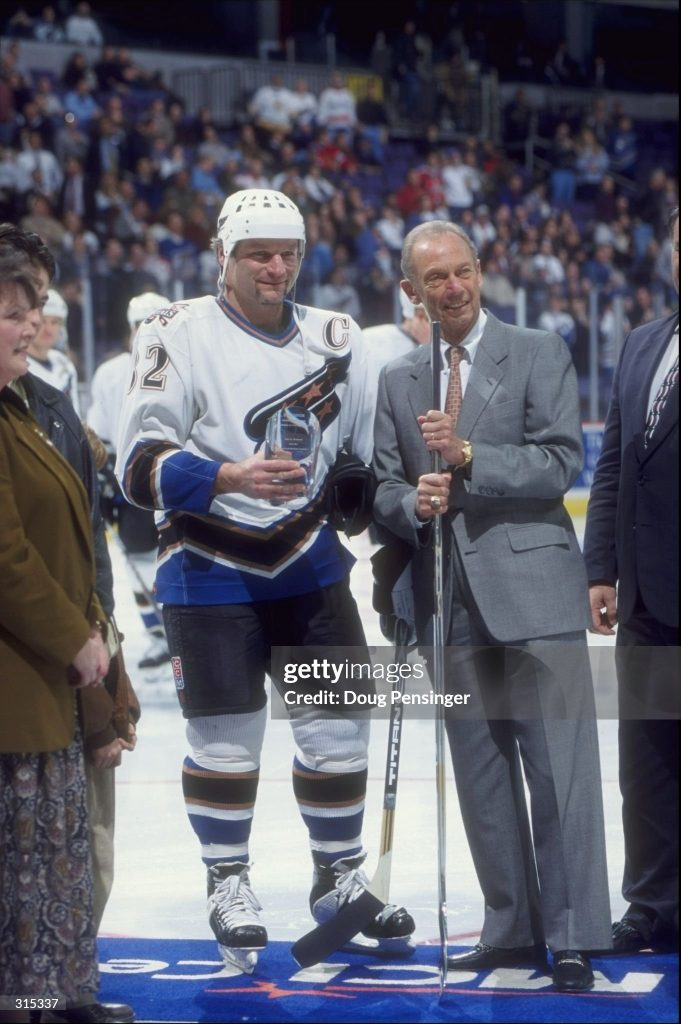
On January 15th, Hunter was honored by the Capitals for reaching 1,000 career points. It was done in a hasty pre-game ceremony during team warm-ups. Owner Abe Pollin presented Hunter with a silver hockey stick while director of special programs a former Capitals player Yvon Labre presented Hunter with a Waterford crystal from the NHL.
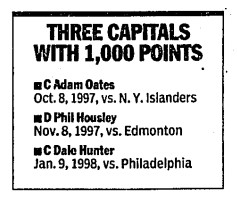
Hunter, along with Center Adam Oates and defenseman Phil Housley became the only three teammates to earn their 1,000th points in the same season.
All three were honored together before the game against the Detroit Red Wings on February 1st.
Olympics
Wilson named Head Coach of Team USA
On November 3rd, 1997, USA Hockey named Washington Capitals head coach Ron Wilson as head coach for Team USA for the 1998 Nagano Olympics. “I’m certainly honored to be extended this privilege,” Wilson said. “It’s a bit of a dream come true. I always wanted to be associated with an Olympic team, and I certainly understand the magnitude of what this is going to be about.”
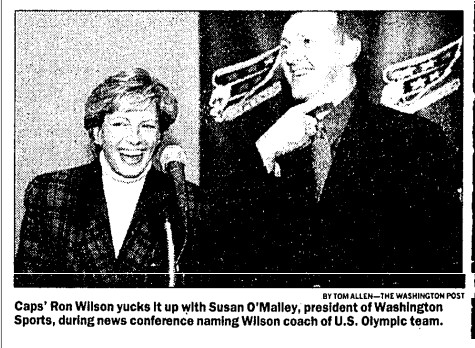
“I don’t think I had to go any further than Ron with the job he did during the World Cup [of Hockey in 1996],” New Jersey Devils and Team USA general manager Lou Lamoriello said. “Seeing the job he did in bringing the players together and caring about each other and not letting each other down, it was not a difficult decision.”
“I look at it as a real positive,” Capitals general manager George McPhee said. “The competition there is going to be at an even higher level than the competition in the NHL, and any experiences gained there can help our club.”
Five Named to Their Respective Countries Olympic Teams
On December 2nd, 1997, five members of the Washington Capitals were named to their countries’ Olympic teams. Forwards Peter Bondra and Richard Zednik were announced as representing Slovakia. Goaltender Olaf Kolzig and forward Jan Benda were named to the German Olympic team, and defenseman Calle Johansson was announced for Sweden’s team.
“I’m disappointed, but there’s no use getting down about it,” defenseman Phil Housley, who played for Team USA during the 1996 World Cup of Hockey, said. “Everyone who’s on that team deserves to be there, and I want to wish them the best of luck. On the other hand, you never know with injuries. I would never want anyone to get injured at all, but if it came to that, I’d still be glad to go.”
“If there’s extras going, of course you want to go, it’s the Olympics,” forward Steve Konowalchuk, who also played for Team USA during the 1996 World Cup of Hockey, said. “But hopefully I’ll be in this game long enough that I can also be considered the next time around.”
Additional Olympic Notes
Over the NHL All-Star weekend, Washington Capitals defenseman Calle Johansson was named captain by Team Sweden for the Olympics. Johansson earned the honor over Toronto Maple Leafs’ forward and captain Mats Sundin and Colorado Avalanche forward Peter Forsberg. “They had a lot of guys to choose from, and they really could have picked any one of us,” Johansson said. “But it’s a real honor. I’m looking forward to it.”
On January 27th, 1998, Capitals forward Andrei Nikolishin was shortlisted to replace injured New York Rangers forward Alexei Kovalev on the Russian Olympic team. “I’m not sure yet what they are going to do,” Nikolishin said. “Of course I would like to go, but I know Igor [Korolev] is playing very well right now. He’s playing on the first power play in Toronto, and he has a lot of points.”
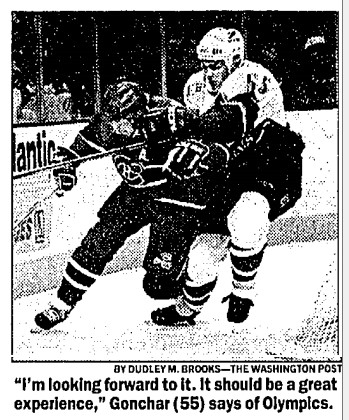
“Andrei is our [Igor] Larionov; he’s a real quality guy and a real good player at both ends of the rink,” general manager George McPhee said. “He worked as hard as any athlete can work during his rehabilitation, and he’s only been able to step back into the lineup at the level he has because of that hard work. I think he’d be a great addition to the Russian team if they ask him.”
On February 4th, 1998, defenseman Sergei Gonchar learned he had been named to the Russian Olympic team. Gonchar became the fifth Capitals player to be named to an Olympic team. “It’s very exciting,” Gonchar said. “I’m looking forward to it. It should be a great experience. I was pretty surprised.”
Preparation for Japan
With the NHL headed into a 2 1/2 week break for the Olympics, the Washington Capitals selected to represent their countries prepared to head to Nagano, Japan. “The thrill will begin when you put on the colors of your country,” forward Peter Bondra said. “I want to do well. I don’t want to disappoint people from home. We [Slovakia] have a young, talented team. We have eight NHL players. I’m looking forward to playing again with them. We used to play together back home. So this is a time of good memories.”
“We should do well on the bigger ice over there,” forward Richard Zednik, another Slovakia representative, said. “I’m only 22. I played in the World Cup. Now I’m going to play in the Olympics. It’s amazing how fast it’s coming. This is a dream come true.”
“I’ve been there one time and played there for a couple of weeks. I’m looking forward to being back again,” Russia defenseman Sergei Gonchar said. “I’ve traveled all over the world. But this is the biggest thing that ever happened in my life. I’m very proud. This is a big honor for me.”
Calle Johansson knew it could be his last opportunity to represent his home country of Sweden. “The next time I will be 34,” Johansson said. “I don’t know if I will make it then. This is going to be something I will remember for the rest of my life.”
Ron Wilson saw this as an opportunity for him to achieve a dream he passed on as a player. In November 1975 Wilson, then 20 years-old, decided the Olympics weren’t worth it, and went to college instead. Wilson was bound to make the 1976 US national team when he decided to walk away from playing in the Olympics.
“We didn’t have what the 1980 and 1984 teams got into, with a pre-Olympic season,” Wilson said. “We were on the traveling bandwagon, playing lower-than-minor league teams, and I didn’t feel giving up a year of college was worth the experience. I don’t think I had any regrets about missing the Olympics as a player until my playing career was close to being over [in 1988]. I understood then that I gave away an opportunity that was there. It’s a black mark on me, but I was 20 years old at the time. I don’t think I was mature enough for the process.”
“Obviously he did a tremendous job at the [1996] World Cup of pulling the team together,” U.S. right wing Pat LaFontaine said. “He’s a great motivator, and he really likes to interact with the players. The guys worked hard under him, but they also enjoyed themselves. His attitude is that if you’re not enjoying it and having fun, you won’t be successful. The atmosphere was always high tempo at practices, and outside of the rink, the coaches had activities and things for us to do that brought us together.”
“It’s starting to feel real; I think about it a lot at night,” Wilson said. “I haven’t really sat down and X’d and O’d anything except the lines and a few practices. Because of the computer programs I have, it only takes me about five minutes to put a practice together. Plus, I have all the stat sheets made up, all that’s been done before, so I just have to put ’98 Olympics’ on it.”
Aggravation with the Olympics
Several of the players felt aggravated going into the Olympics. One player in particular felt this before even landing in Japan. “I found out after we landed at the airport; I saw the score on Japanese TV,” Germany goaltender Olaf Kolzig said. “It’s disappointing. I made this whole trip basically for nothing.”
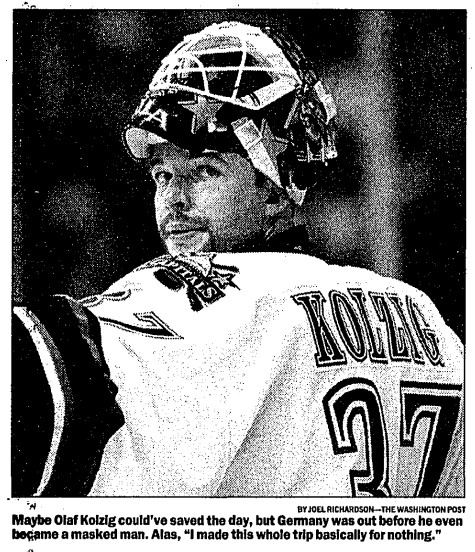
Germany was blown out by Belarus 8-2 while Kolzig was still in route, and was eliminated from making it to the main draw of the Olympic hockey competition. Kolzig did get to play in Germany’s consolation game which was a 2-0 shutout victory over France.
“Olaf Kolzig would have been a big factor if he was allowed to be here,” Germany coach George Kingston said. “He’s one of the finest hockey players in the National Hockey League at the goalie position. The National Hockey League is in business; they’re not necessarily in sport. The Olympics are about sport.”
Noting how Mighty Ducks of Anaheim defenseman Ruslan Salei played for Belarus as a result of his two game suspension by the NHL and the Ducks allowing him to leave early to play in the Olympics, Kingston was not pleased. “The competitive advantage that has happened here, that’s unfair,” Kingston said. “What’s the lesson to players? Get suspended? The International Ice Hockey Federation has to put some spine in, some rules in. What’s Latrell Sprewell doing? Is he playing in the Continental Basketball Association?”
“I think I agree,” Kolzig said. “Teams like Slovakia and Germany are not exactly hockey powerhouses. They need all the help they can get. If you look at the way this is set up, it’s basically catered to the big six [teams already in the main draw], but what can you do?”
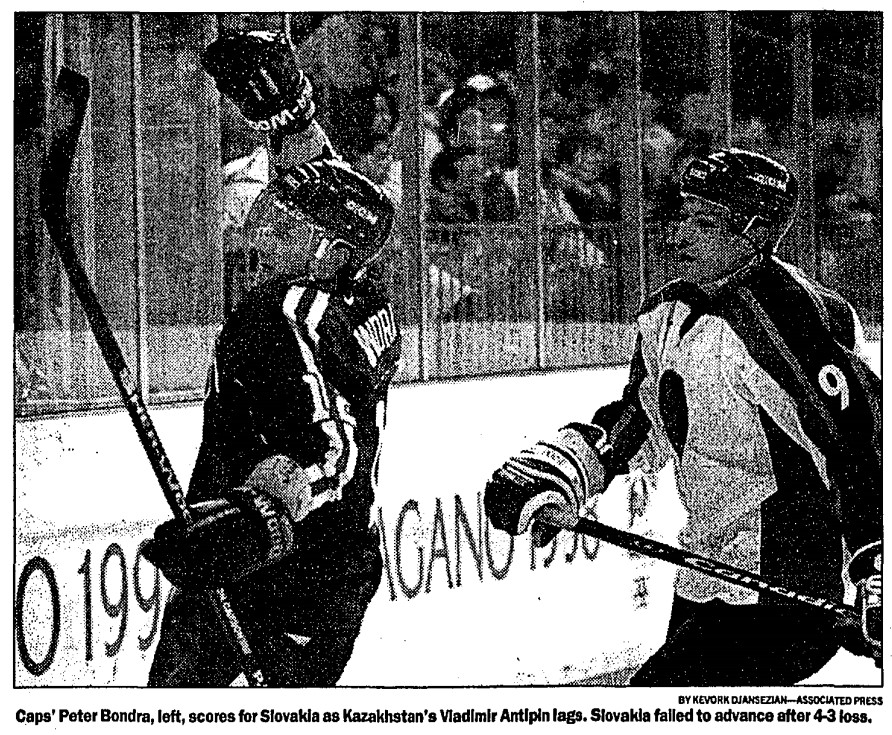
Unlike Kolzig, forward Peter Bondra was able to play for Slovakia, but forward Richard Zednik was not. In fact, four additional Slovaks sat in the stands in street clothes as Slovakia lost to Kazakhstan 4-3 to be eliminated from the tournament. “I thought we had a good team. I don’t know why we had to go through the preliminary tournament,” Bondra said. “I don’t know why those guys had to sit upstairs. It’s not fair; they are Slovak, they should play. This is hard to swallow. I will probably think about this for the rest of my life.”
Per IIHF rules, teams are mandated to adhere to one roster throughout the first round (preliminary tournament), and are allowed to switch players if they advance to the main draw. Due to this inflexibility, teams like Slovakia and Germany were put into a quandary. The IIHF’s rules were 3 years old, but several were changed to allow NHL players to compete in the Olympics for the first time.
“I just got here last night, and now I can’t play in any of the games,” Zednik said. “We flew all the way over here for nothing. If you just saw our roster, you’d know we could win this preliminary tournament, but we weren’t allowed to play.” Because Zednik was listed as a non-roster player, he was unable to play in the consolation games.
Bondra vs. Kolzig: Friend or Foe?
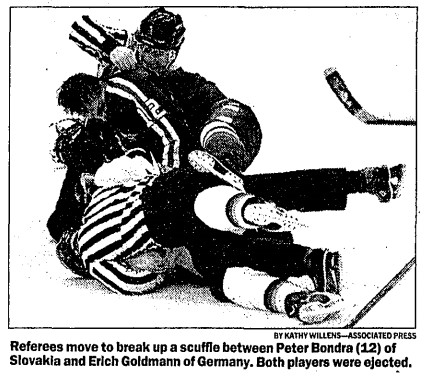
On February 12th, at Big Hat arena, Germany faced Slovakia in the final consolation game of the Olympic men’s ice hockey tournament. The game put Washington Capitals teammates Peter Bondra and Olaf Kolzig against each other. Bondra was ejected with 5 minutes left in the game for fighting Germany defenseman Erich Golmann in front of Kolzig’s crease. Kolzig felt conflicted on what to do. Help his Capitals teammate, or help his national teammate. “I didn’t want Peter to get into that with my teammate, and I also didn’t want him to leave the tournament that way,” Kolzig said. “But he was frustrated. Slovakia finished far from where they expected. I talked to him Wednesday, and he was one unhappy guy.”
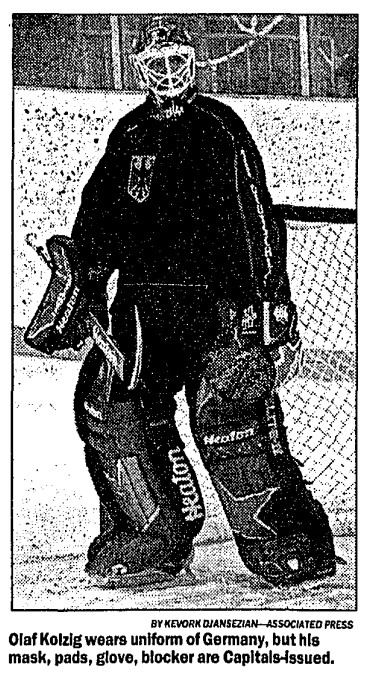
“It was just enough is enough — I can only take so many cross-checks,” Bondra said. “I thought maybe Olie was going to help me, but he’s on the other team, so of course he didn’t.”
Germany defeated Slovakia 4-2 making Germany 9th place, and Slovakia 10th place respectively at the Olympics. Capitals rookie forward, and minor leaguer, Jan Benda scored the game-tying and game-winning goals for Germany. Capitals forward prospect Stefan Ustorf also played for Germany.
Bondra was unable to score against Kolzig, but both agreed after the game, the goaltender has the advantage when the skater and goaltender know each other so well. “Olie knows my favorite shot or moves from practice, so I tried to change it up on him, and that was probably the problem for me,” Bondra said.
“I’m sure he told all his teammates where to shoot on me, which is why they scored two over my glove,” Kolzig said with little sympathy.
The Remainder of the Tournament
On February 13th, the United States played their first game of the Olympics, and it was disappointing as they fell to Sweden 4-2. “We went into this game thinking the Swedes were one of the best teams here,” coach Ron Wilson said. “And we came out of it maybe thinking they were the best team.”
On the other side, Sweden defenseman Calle Johansson didn’t score, but coach Kent Forsberg named Johansson as one of the game’s best players against the Americans. “It feels good to win, although it’s a long tournament and this was only the first game,” Johansson said. “It’s always easier to work when you win instead of losing. You don’t have to look in the rearview mirror all the time; you can look ahead.”
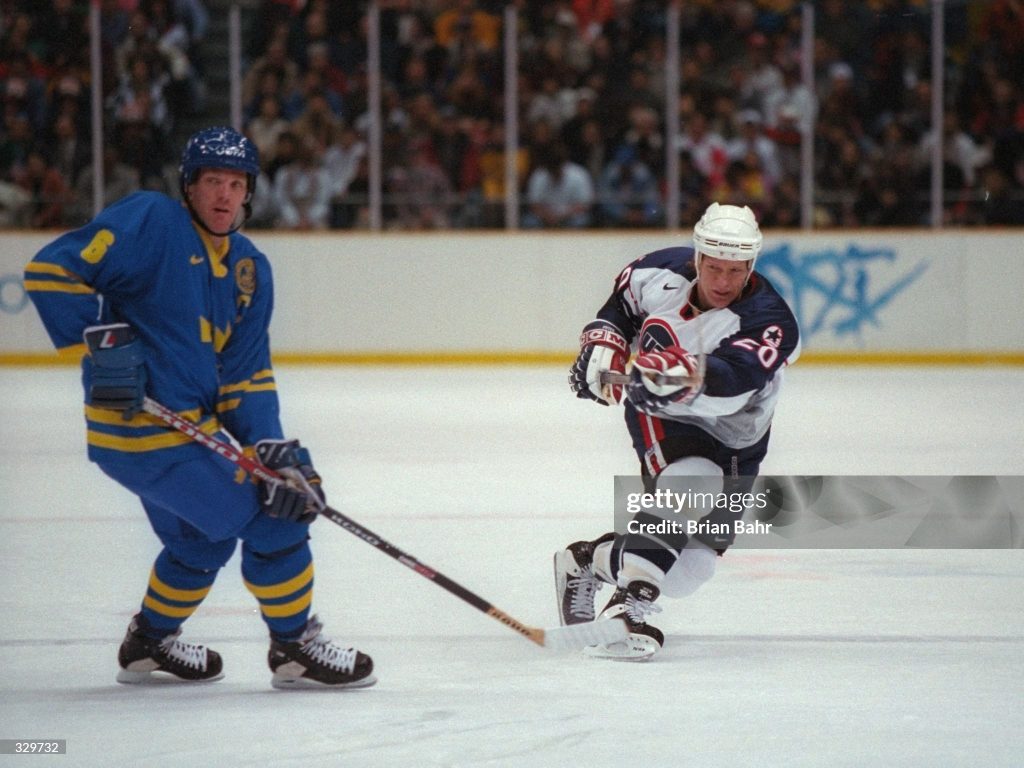
The next day, Russia defeated Finland 4-3, and defenseman Sergei Gonchar had an assist in the game. Originally not scheduled to play for the Russians, Gonchar replaced injured defenseman Alexander Karpovtsev. “I thought maybe I would get picked the first time they made the list, but I wasn’t playing in Washington, so they didn’t want to take me,” Gonchar said. “I was just glad that when the opportunity came up, I was the one they thought of.”
“Everyone is playing with a lot of excitement, and as the games go on, we get better and better because players are getting used to each other,” Gonchar said as the Russians were 2-0 in the tournament. “As a part of the team, I’ve been playing better as the games have been going on. I feel much more confidence.”
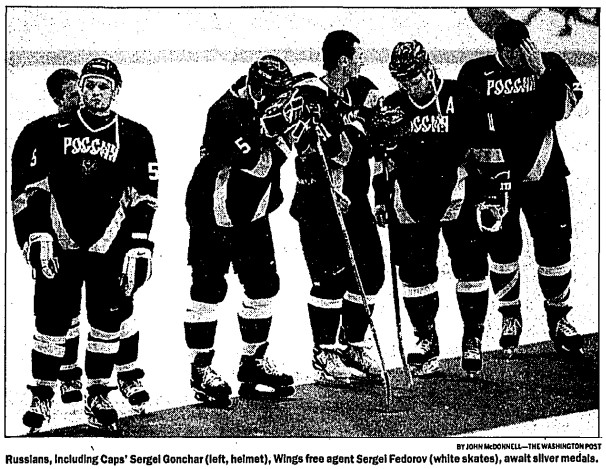
On February 22nd, the Czech Republic defeated Russia 1-0 in the gold medal game, and Gonchar became the only Capitals player to earn a medal at the Nagano Olympics. “There were a lot of guys from the [Russian] federation in the locker room, saying we did everything we could, and that helped,” Gonchar said. “The atmosphere and how I felt in the final — it’s a different feeling than anything I’ve had before. I’ll remember all 60 minutes of the game and those moments after. It’s probably a once-in-a-lifetime thing.”
“Coach Wilson was telling us all how he was going to come back and show us the gold medal he won,” Gonchar joked. “Now, I can show him mine.”
A Messy Situation
On February 19th, after the US men’s hockey team was eliminated from the tournament, an unknown number of players damaged three hotel rooms. Ten chairs were broken, and three fire extinguishers were emptied. Six of the chairs, and one fire extinguisher were thrown from the fifth floor to the courtyard. One door was dented, as were several walls. Floors and beds were damaged as well. No injuries were reported.
“This is an unfortunate incident and one that we deeply regret,” said David Ogrean, executive director of USA Hockey. “We believe only a handful of individuals were involved. Nevertheless, we will work with the NHL and NHL Players Association in an effort to determine exactly who was responsible. The actions of a few should not be constructed as a representative of an entire team.”
“If it is true, it shows a total lack of control and lack of respect for the Olympics,” said Olaf Kolzig, who played for Germany in Nagano. “Not to mention, it is going to give the NHL [and] the American players a black eye.”
“I would be disappointed if the damage was done out of anger because they got beat,” Washington Capitals assistant coach Tim Army said. “That’s why you have 60-minute games. If you’re that angry, then do it during the game and then forget about it afterward and handle yourself with class. And that would be disappointing if it comes to fruition that that was the result of U.S. players.”
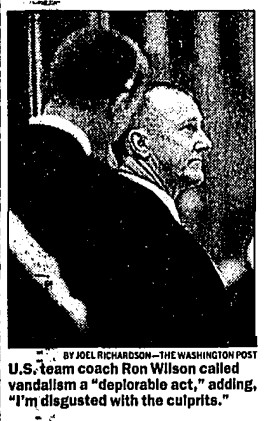
On February 21st, it was reported that after a more detailed investigation, the Nagano Organizing Committee officials increased the estimated cost of the damage to the rooms. The US Olympic Committee and the NHL offered to pay for the $3,000 in damages. The initial estimate was $1,000.
After taking time to assess the situation, coach Ron Wilson criticized the few players involved. “It is an unfortunate incident and I am embarrassed by it,” said Wilson, who learned of the situation after most of the players had left to return to the United States. “It’s inexcusable what they did. It shows no class at all. [Understands that it’s] one or two guys did it, this deplorable act. … Unfortunately everybody is guilty by association … I’m disgusted with the culprits and they should never be involved in an event like that again.”
With these milestones, accolades, and the Olympics in the rearview mirror, the Washington Capitals look to the final third of the regular season. Stay tuned for Chapter 9: Final Third of the Season.

TXHT may earn an Affiliate Commission if you purchase something through Cool Hockey and Dr. Squatch ads/links in this article.
RESOURCES
- Alexander, Rachel. “In a Grand Performance, Oates Leads Capitals, 6-3,” October 9, 1997. https://www.washingtonpost.com/archive/sports/1997/10/09/in-a-grand-performance-oates-leads-capitals-6-3/e9beb229-ef62-43be-8195-c72c83399b30/.
- Alexander, Rachel. “Gonchar Returns With a Goal,” October 12, 1997. https://montgomery.idm.oclc.org/login?url=https://www.proquest.com/hnpwashingtonpost/historical-newspapers/capitals-3-islanders-1/docview/1444634350/sem-2?accountid=47412.
- Alexander, Rachel. “Wilson Is Olympic Coach,” November 4, 1997. https://www.washingtonpost.com/archive/sports/1997/11/04/wilson-is-olympic-coach/5e2502f5-a7a5-48ed-8d6b-af7724422b4c/.
- Alexander, Rachel. “Oates, Ranford Welcomed Upon First Visit to Boston,” November 7, 1997. https://montgomery.idm.oclc.org/login?url=https://www.proquest.com/hnpwashingtonpost/historical-newspapers/professional-hockey/docview/1457298349/sem-2?accountid=47412.
- Alexander, Rachel. “Alleged Slur Mars Caps’ Win,” November 9, 1997. https://www.washingtonpost.com/archive/sports/1997/11/09/alleged-slur-mars-caps-win/ebbf5841-467f-425f-97b3-cab0b08ec1c9/.
- Alexander, Rachel. “CAPITALS NOTEBOOK Everyone Wants Wilson To Talk Olympic Talk,” November 19, 1997. https://montgomery.idm.oclc.org/login?url=https://www.proquest.com/hnpwashingtonpost/historical-newspapers/professional-hockey/docview/1454469804/sem-2?accountid=47412.
- Alexander, Rachel. “Five Capitals Selected for Olympics,” December 3, 1997. https://www.washingtonpost.com/archive/sports/1997/12/03/five-capitals-selected-for-olympics/f09452cc-e2f9-4d99-b5c1-502d5945818d/.
- Alexander, Rachel. “Capitals’ Simon Will Have Surgery; Nikolishin Returns,” January 6, 1998. https://www.washingtonpost.com/archive/sports/1998/01/06/capitals-simon-will-have-surgery/ed2f085f-11a4-4a9e-aa07-36cca5b1f700/.
- Alexander, Rachel. “Hunter Is Capitals’ Point Man in 4-1 Win Over Flyers,” January 10, 1998. https://montgomery.idm.oclc.org/login?url=https://www.proquest.com/hnpwashingtonpost/historical-newspapers/hunter-is-capitals-point-man-4-1-win-over-flyers/docview/1619934128/sem-2?accountid=47412.
- Alexander, Rachel. “Brunette Burns Blackhawks: Capitals Rookie Scores Winner; Bondra Close to New Deal,” January 16, 1998. https://www.washingtonpost.com/archive/sports/1998/01/16/brunette-burns-blackhawks/ef694251-fdd3-46fc-b2fb-fc7f470762d5/.
- Alexander, Rachel. “Bondra Agrees to New Deal: Caps Secure All-Star Through 2000-2001,” January 17, 1998. https://www.washingtonpost.com/archive/sports/1998/01/17/bondra-agrees-to-new-deal/9d1ba813-e87e-4744-a5b6-9946d5ab7ae5/.
- Alexander, Rachel. “Bondra Loses Fastest Skater Title to S. Niedermayer,” January 18, 1998. https://montgomery.idm.oclc.org/login?url=https://www.proquest.com/hnpwashingtonpost/historical-newspapers/bondra-loses-fastest-skater-title-s-niedermayer/docview/1620811630/sem-2?accountid=47412.
- Alexander, Rachel. “North America Rules the World (in Hockey): U.S., Canada Win All-Star Game, 8-7, in Precursor to the Olympics,” January 19, 1998. https://montgomery.idm.oclc.org/login?url=https://www.proquest.com/hnpwashingtonpost/historical-newspapers/north-america-rules-world-hockey/docview/1619994955/sem-2?accountid=47412.
- Alexander, Rachel. “Caps’ Johansson Captains Sweden,” January 20, 1998. https://www.washingtonpost.com/archive/sports/1998/01/20/caps-johansson-captains-sweden/214fb857-126b-4b47-8ddd-0fc7f8199fce/.
- Alexander, Rachel. “Nikolishin Might Be Bound for Olympics,” January 28, 1998. https://www.washingtonpost.com/archive/sports/1998/01/28/nikolishin-might-be-bound-for-olympics/a8cb1d52-0d1e-4826-b506-d5ed3721e3c7/.
- Maske, Mark. “Caps’ Gonchar To Skate for Team Russia,” February 5, 1998. https://www.washingtonpost.com/archive/sports/1998/02/05/caps-gonchar-to-skate-for-team-russia/6c0cb368-cfaa-4c8e-acce-cdef1c4d3c79/.
- Gildea, William. “Capitals’ Players Gear Up For Olympic Competition,” February 7, 1998. https://www.washingtonpost.com/archive/sports/1998/02/07/capitals-players-gear-up-for-olympic-competition/8ab756d0-5aa9-42cd-97ea-a628349eb1d6/.
- Alexander, Rachel. “Wilson’s Shot at Goal Comes as U.S. Coach,” February 7, 1998. https://www.washingtonpost.com/archive/sports/1998/02/07/wilsons-shot-at-goal-comes-as-us-coach/20de0777-7bb1-4e52-aec4-079d3261fe72/.
- Alexander, Rachel. “Talk About a Shutout: Kolzig Arrives Already on Ice,” February 10, 1998. https://www.washingtonpost.com/archive/sports/1998/02/10/talk-about-a-shutout-kolzig-arrives-already-on-ice/721e7176-6ce9-4654-8294-c3b3eb5c1a5f/.
- Alexander, Rachel. “Inflexible Rosters Put Early End to 3 Caps’ Olympics,” February 11, 1998. https://montgomery.idm.oclc.org/login?url=https://www.proquest.com/hnpwashingtonpost/newspapers/inflexible-rosters-put-early-end-3-caps-olympics/docview/408353078/sem-2?accountid=47412.
- Alexander, Rachel. “Kolzig Put on the Spot: Is Bondra Friend or Foe?,” February 13, 1998. https://www.washingtonpost.com/archive/sports/1998/02/13/kolzig-put-on-the-spot-is-bondra-friend-or-foe/7d1510ad-acd2-4b02-9e01-1084f71a60d0/.
- Alexander, Rachel. “U.S. Men’s Hockey Team Gets Lost in Space, 4-2,” February 14, 1998. https://www.washingtonpost.com/archive/sports/1998/02/14/us-mens-hockey-team-gets-lost-in-space-4-2/f820b311-f854-4402-b53a-5c7baa6cf57c/.
- Alexander, Rachel. “Gonchar’s Just Happy to Assist: Despite the Late Call, Caps’ Star Fits in Nicely With Russian Squad,” February 16, 1998. https://montgomery.idm.oclc.org/login?url=https://www.proquest.com/hnpwashingtonpost/historical-newspapers/gonchars-just-happy-assist/docview/1620149825/sem-2?accountid=47412.
- Alexander, Rachel. “For Gonchar, a Silver Lining: Hasek-Led Czech Republic Takes Hockey Gold, 1-0 Over Russia,” February 23, 1998. https://www.washingtonpost.com/archive/sports/1998/02/23/for-gonchar-a-silver-lining/96546240-c246-411d-a23b-dd2190f40679/.
- Alexander, Rachel. “Hockey Players Do Damage,” February 20, 1998. https://www.washingtonpost.com/archive/sports/1998/02/20/hockey-players-do-damage/49a4ec0c-79f1-43b5-a7f4-39933df82550/.
- Knight, Athelia. “Kolzig, Caps Assistant Dismayed by Trashing,” February 21, 1998. https://www.washingtonpost.com/archive/sports/1998/02/21/kolzig-caps-assistant-dismayed-by-trashing/bb9def02-f229-45c6-9c46-a91f0f1423b1/.
- “Trashing Damage Worse Than Original Estimate,” February 21, 1998. https://www.washingtonpost.com/archive/sports/1998/02/21/trashing-damage-worse-than-original-estimate/83a6a14c-6b8a-4ce5-968d-00fe6c17d91a/.
- Knight, Athelia. “Wilson Criticizes Behavior of U.S. Men’s Hockey Team,” February 24, 1998. https://www.washingtonpost.com/archive/sports/1998/02/24/wilson-criticizes-behavior-of-us-mens-hockey-team/4035ed21-3ad2-4cea-a20b-263a980b8ad9/.
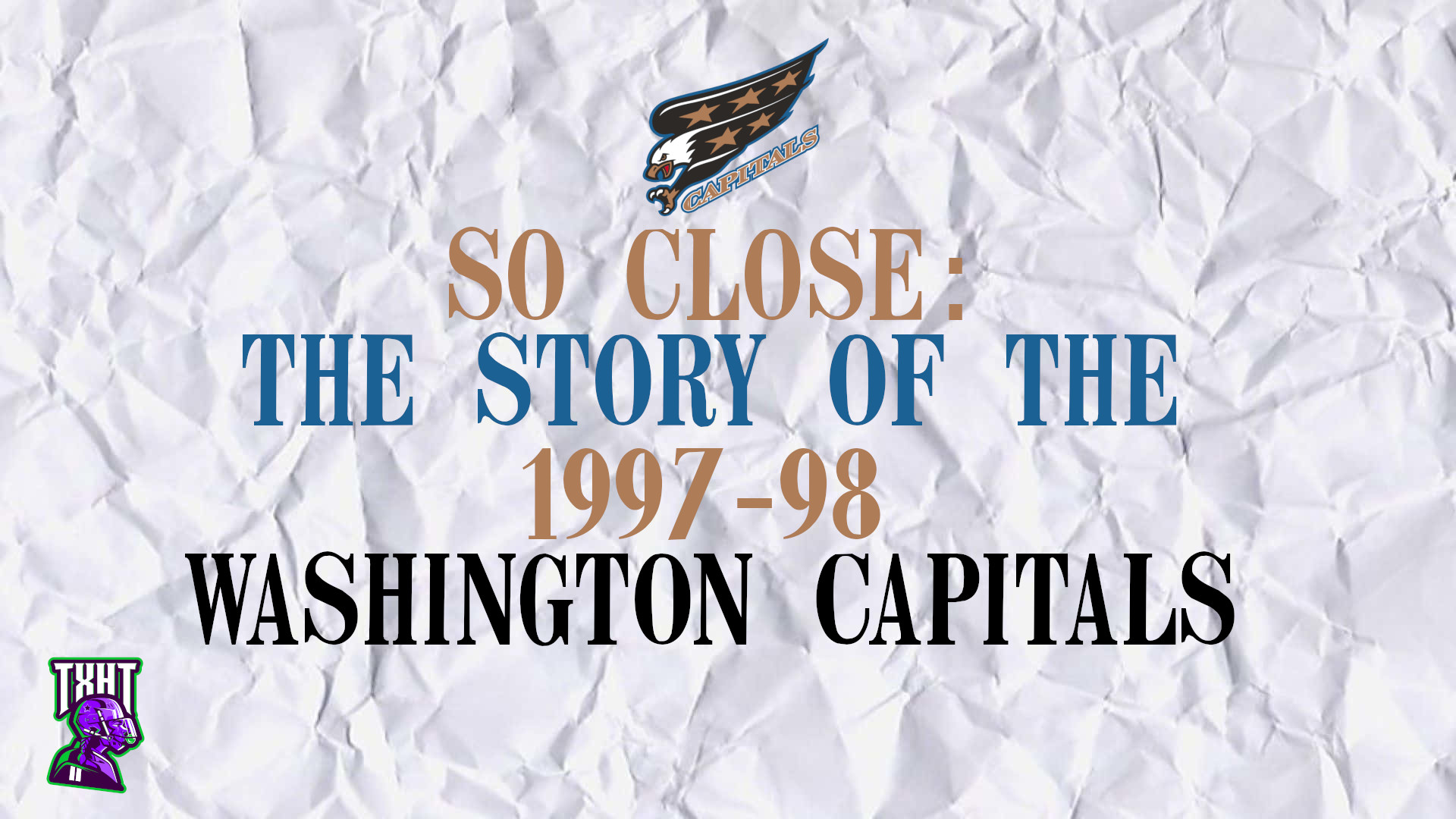
Leave a Reply